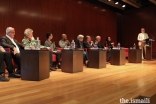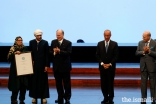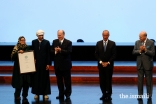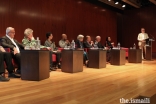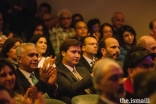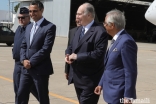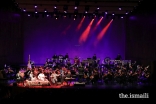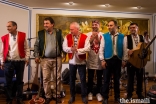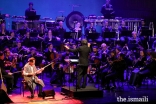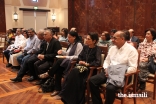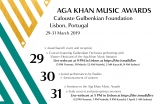Ismaili Centres Archive
No terceiro dia da cerimónia inaugural dos Prémios Aga Khan para a Música, célebres figuras do Mundo da música e das artes uniram-se para uma conversa relacionada com o conceito, visão e impacto dos Prémios. No seminário, estiveram ainda presentes Mawlana Hazar Imam, o Príncipe Amyn, o Príncipe Hussain e o Príncipe Aly Muhammad.
A 1ª edição dos Prémios Aga Khan para a Música chegou ao fim com um grandioso evento que contou com a presença de Mawlana Hazar Imam, sua Excelência, o Presidente da República Marcelo Rebelo de Sousa e do Príncipe Amyn, que premiaram 10 vencedores.
At a momentous and celebratory event held at the Calouste Gulbenkian Foundation in Lisbon, the Aga Khan Music Awards reached a crescendo, as His Excellency President Marcelo Rebelo de Sousa, Mawlana Hazar Imam, and Prince Amyn awarded prizes to ten laureates, representing 13 countries around the world.
On the third day of the inaugural Aga Khan Music Awards, eminent figures in the realm of arts and music came together to participate in discussions relating to the concept, vision, and impact of the Awards. The Seminar was attended by Mawlana Hazar Imam, Prince Amyn, Prince Hussain, and Prince Aly Muhammad.
Earlier today, finalists for the Aga Khan Music Awards’ Award in Performance category performed for a live audience, which included Prince Amyn, Prince Hussain, and Prince Aly Muhammad.
Mawlana Hazar Imam arrived in Lisbon today to preside over the inaugural Aga Khan Music Awards ceremony. Taking place from 29-31 March at the Calouste Gulbenkian Foundation, the Aga Khan Music Awards will feature three days of concerts and events honouring laureates in the six domains being recognised by the Award.
In response to Mawlana Hazar Imam’s vision to bring together jamats from around the world, several American Ismaili athletes recently traveled to India and Pakistan to demonstrate fellowship through sports.
Mawlana Hazar Imam chegou hoje a Lisboa para presidir a cerimónia inaugural dos Prémios Aga Khan para a Música. A ter lugar entre os dias 29 e 31 de Março na Fundação Calouste Gulbenkian, os Prémios Aga Khan para a Música contarão com três dias de concertos e eventos em homenagem aos vencedores nos seis domínios a serem reconhecidos pelo Prémio.
No dia 29 de Março, a Orquestra da Gulbenkian, conduzida pelo maestro Pedro Neves, atuou em conjunto com os Master Musicians da Iniciativa Aga Khan para a Música, do Tajiquistão, Síria e Afeganistão, na presença de Mawlana Hazar Imam e membros da Sua família.
For communities residing among the Pamir mountains of Tajikistan, music is part of everyday life, appreciated and practiced at every opportunity. On 28 March 2019, Nobovar Chanorov and the Shams group of music artists shared a medley of Pamiri sounds to an enthralled audience at the Ismaili Centre, London.
On 29 March, the Gulbenkian Orchestra, led by maestro Pedro Neves, performed new works with Master Musicians of the Aga Khan Music Initiative from Tajikistan, Syria, and Afghanistan, in the presence of Mawlana Hazar Imam and members of his family.
As part of a series of interviews, Fairouz Nishanova discusses the work of the Aga Khan Music Initiative (AKMI), and its positive impact in strengthening community, identity, and access to diverse forms of cultural expression. The.Ismaili is pleased to publish this interview ahead of the inaugural Aga Khan Music Awards to commence later today.
The 2019 Aga Khan Music Awards will open with a concert on Friday 29 March in which the Gulbenkian Orchestra, led by maestro Pedro Neves, will perform new works with Master Musicians of the Aga Khan Music Initiative from Tajikistan, Syria, and Afghanistan. The event is expected to begin at 9 PM GMT and will be webcast at the.ismaili/live.
In 1978, the Canadian Jamat awaited Hazar Imam’s first visit to Canada with excitement. Shamshu Jamal, a talented Vancouver musician, expressed his joy on this blessed occasion by composing “Maara Mawla Canada Padhaarshe,” the devotional music piece that would go on to become an iconic musical tribute in the Canadian Ismaili community for generations.
In Pakistan, music is a form of cultural expression representing society’s values, traditions, and hopes for the future. From mountainous Gilgit-Baltistan in the North to Karachi on the Southern coast, people have a deep relationship with music and other forms of art.
What is your first memory of music? Can you remember a time when you were so engrossed in a musical compilation that you forgot where you were physically? Many members of the Jamat use music as a connection to their heritage, their upbringing, and their community. In this article we will explore some of their stories.


